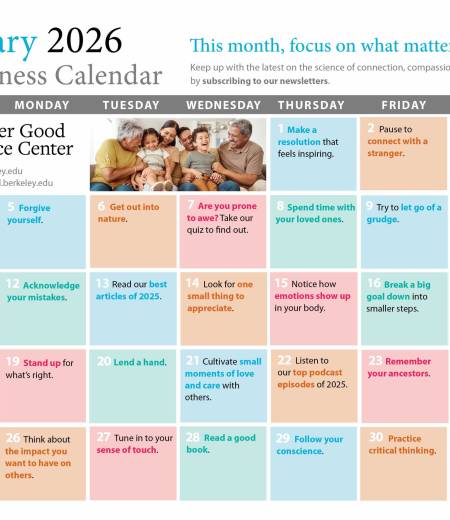We have emotions for a reason. Anger in response to injustice can signal that the situation needs to change; sadness in response to loss can signal that we’d like to keep the people we love in our lives.
 Our Mindful Mondays series provides ongoing coverage of the exploding field of mindfulness research.
© Dan Archer
Our Mindful Mondays series provides ongoing coverage of the exploding field of mindfulness research.
© Dan Archer
It’s when we ruminate, or get caught up in our emotions, that they might become maladaptive. That’s when emotion regulation can be helpful and healthy.
Previous research has shown that mindfulness can be an effective tool to help regulate our emotions. But why? A new model suggests that the ability to control one’s behavior—a concept that researchers call executive control—may play a role.
In a recent paper published in Current Directions in Psychological Science, researcher Rimma Teper and her colleagues at the University of Toronto write that, despite the common misconception that meditation “empties our head” of emotions, mindfulness actually helps us become more aware and accepting of emotional signals—which helps us to control our behavior.
I talked with Rimma Teper about how mindfulness relates to emotion regulation, and how executive control fits into the picture.
Emily Nauman: In your paper, you write that mindfulness helps us change our attitude toward an emotion, rather than focusing on changing an emotion itself. What is the difference between changing our relationship to an emotion and changing the emotion itself? What’s beneficial about the former?
Rimma Teper: I should start off by saying that I am of the view that emotional experiences are mostly a good thing! We, as humans, evolved to have emotional responses to certain situations that actually help us in our everyday lives.
For instance, feeling fear when you see a snake signals that you should stay away. Feeling love for your family and friends promotes behaviors that foster close relationships. Of course, there are cases where emotional responses may be overblown, or maladaptive—and this is where emotion regulation becomes a necessary tool. Mindfulness is just one strategy that can help with emotion regulation.
As you mentioned, most emotion regulation strategies that people engage in change the nature of the emotion. These strategies may include reevaluating the situation that elicited the emotion, or suppressing the emotion altogether through distraction or some other means. Mindfulness, on the other hand, encourages people to observe their emotional experiences without trying to change them.
I think that one benefit of this approach is that it discards the tendency of “labeling” one’s emotions as good or bad. It encourages people to simply observe the contents of their mind. In this way, I think that mindfulness allows for greater self-insight.
So for instance, if I feel angry, I might try to observe my thoughts without getting caught up in them. I would also pay attention to the bodily sensations that accompany that emotion, like my heart beating quickly. By paying attention to way in which the emotion unfolds in your body, step-by-step, mindful people are able delay and dampen the rumination or overblown reaction that often accompanies it.

EN: What is executive control, and why did you suspect that executive control plays a role in the link between mindfulness and emotion regulation?
RT: Executive control can often be equated with willpower. There are a number of skills that fall under the umbrella of executive control, but the one that is specifically related to mindfulness is the ability to inhibit one’s impulses.
Previous research, including some of our own, has suggested that mindfulness may help to improve executive control. In addition, a lot of previous research has also linked mindfulness to improvements in emotion regulation.
But no one really knew exactly how mindfulness improved emotion regulation. This “gap” in the research made us wonder whether executive control might be the pathway through which mindful people are better able to regulate their emotions.
After all, executive control involves the inhibition of automatic or impulsive behaviors. And for most of us, getting carried away with our emotions is something we do automatically and without notice. When we feel sad or angry, we often let our emotions snowball. We also often ruminate about negative things that have happened to us. So to us, it made sense that executive control would be involved in curbing these maladaptive patterns.
EN: How have people thought about mindfulness and emotion regulation in the past, and what insights does your model bring to our understanding of how mindfulness and emotion regulation are related?
RT: The link between mindfulness and improved emotion regulation is certainly not a new one. What our model does is examine the nature of this relationship and helps to understand how mindfulness may improve emotion regulation.
There is often a misconception that mindfulness simply leads to less emotionality, or that mindful people experience less emotion.
Our model proposes that this is not the case. Specifically, we suggest that mindfulness leads to improvements in emotion regulation not by eliminating or reducing emotional experience, but rather through a present-moment awareness and acceptance of emotional experience. This sort of attentive and open stance towards one’s own emotions and thoughts allows the individual to still experience emotion, but also to detect emotions early on and stop them from spiraling out of control.
EN: How can we apply the insights of this model to our daily lives? What’s useful about understanding that mindfulness helps us become aware of and accept emotions, rather than “emptying our head” of emotions?
RT: As I mentioned before, emotions are usually a good thing! But there are also cases when they can be disruptive and maladaptive.
So rather than getting rid of emotional experience altogether, our model provides insight into the ways in which we can prevent or limit the disruptive aspects of emotions, like rumination. And this can be done by monitoring your thoughts and sensations, but also by adopting a non-judgmental attitude towards them.








Comments